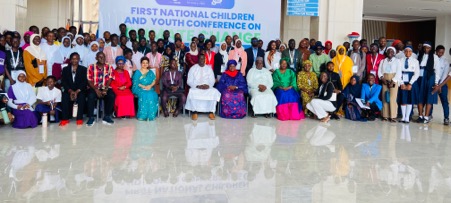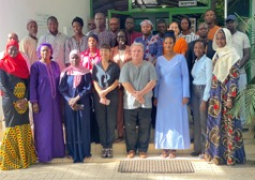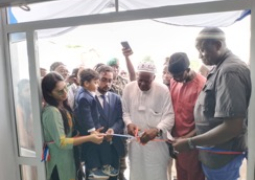
The event was aimed at engaging children and youth in climate advocacy and to actively empower them to address climate change. Thus, the theme for the confab was “Accelerating Children and Youth Voice for Climate Resilience in The Gambia.”
The event attracted cabinet ministers, senior government officials, civil society organizations (CSOs) and young climate advocates.
At the event, Rohey John-Manjang, minister for Environment and Natural Resources, said the active participation of youth in climate change resilience is critical in view of the country’s vulnerable situation to its impact.
“Our oceans are warming up and changing and threatening unprecedented sea level rise. Summers are getting hotter in many parts of the world with temperatures rising to as high as 45 degrees, we will all agree that 2023 and 2024 recorded the highest unprecedented temperature when compared to about 100 years ago.”
To positively revise biodiversity, enhance food security and undo climate change, she outlined the need for all shareholders to join in supporting and implementing the 2024 World Environment Day slogan, which focus on generation of installations.
Fatou Jeng, founder of Clean Earth Gambia, thanked the organising team and development partners for their support.
She emphasised that youth and children have key responsibility as protectors of the environment.
“This conference is one of the avenues we will like to use to make sure we are not only engaging policy dialogues but making sure that we are coming up with tangible recommendations and solutions that we will present to the government to make sure that the initiatives and programs that are implemented are more youth and children friendly.” she said.
Bakary K. Badjie, Minister for Youth and Sports, pointed out that climate change is no longer an issue for environmentalists or small group of people to handle. Instead, it has become a global menace that everyone should be concerned about.
“The starting point for what is going to give us the change is to galvanise the support of young people, including children and women, to promote and stop the issue of climate change. As young people, we all have a responsibility to protect our environment and be ambassadors.
Ms. Nafisa Binte Shafique, UNICEF Country Representative to The Gambia, said climate change is a child rights issue and that everyone must join the effort to tackle it for the betterment of children.
“The Gambia is identified globally as one of the most vulnerable countries to climate change and among the 10 countries most vulnerable to coastal erosion and sea level rise in the world, erratic flooding, storms, and drought. Children in the Gambia are the most affected by climate change.”





